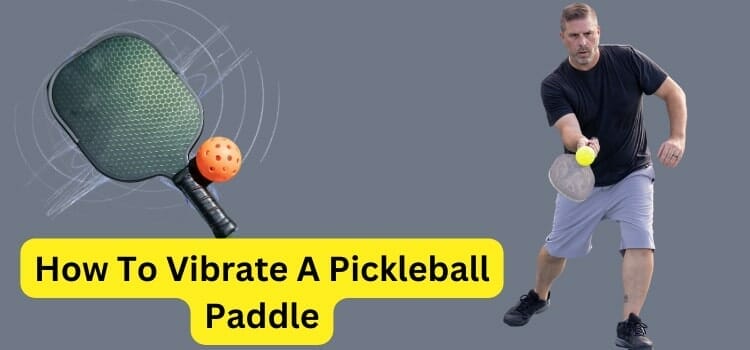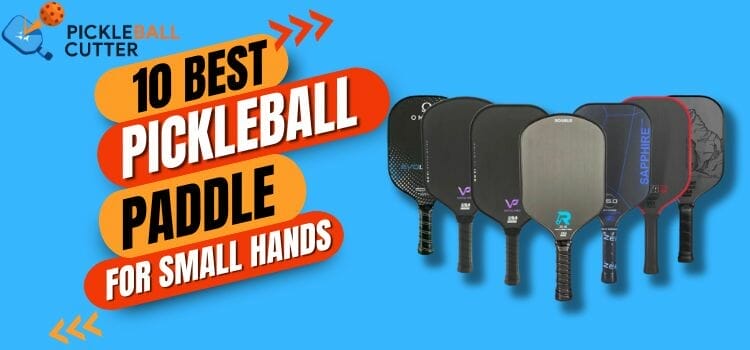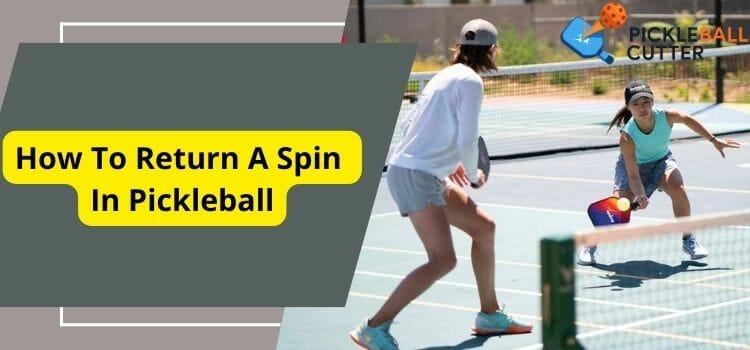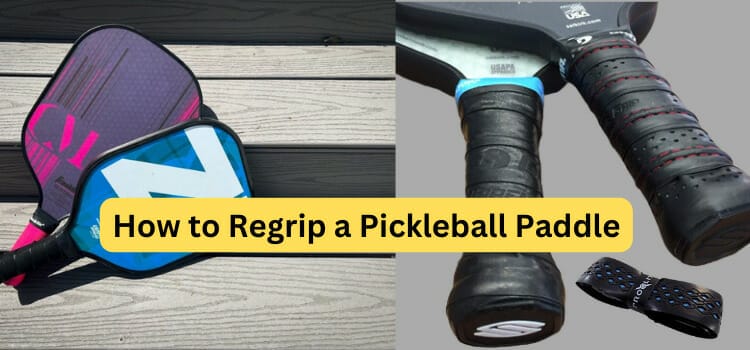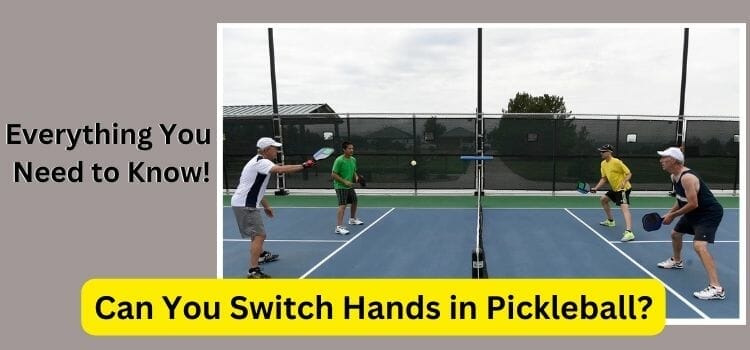What Happens If You Drop Your Paddle In Pickleball?

Whether you’re a seasoned pro or just starting out in pickleball, have you ever wondered what happens when your paddle drops?
So the answer is when your pickleball paddle slips from your grip, the outcome hinges on where it lands. If it touches your side of the court, no fault is incurred. However, if it lands on the opponent’s side, the Non-Volley Zone, or makes contact with the net or net post, it’s considered a fault.
Here I’ll explore the consequences of dropping your paddle on the court and share some valuable tips on how to avoid such mishaps. So grab a seat and let’s dive into this crucial aspect of our beloved sport!
What Happens If You Drop Your Paddle In Pickleball?
Dropping your paddle during a pickleball game can lead to various outcomes depending on where and how it lands.
Here are the possible scenarios
1. Fault Or No-Fault
According to the USA Pickleball Official Rulebook, the determination of whether dropping your paddle is considered a fault or not depends on where the paddle lands:
- Not a Fault: If your paddle drops and lands on your side of the court, it is typically not considered a fault. You can continue playing, but you’ll need to retrieve your paddle quickly.
- Fault: If your paddle lands on the opponent’s side of the court, in the Non-Volley Zone (commonly referred to as the “kitchen”), or if it touches the net or net post during the fall, it is generally considered a fault. In such cases, you lose the point.
2. Distraction
Regardless of whether it’s a fault or not, dropping your paddle can disrupt your concentration and rhythm. Quickly recovering from this distraction is essential to maintain your competitive edge.
3. Paddle Damage
The manner in which your paddle falls can impact its condition. While some minor cosmetic damage may not significantly affect your performance, more substantial damage, such as cracks or chips in the paddle face, can alter your shots and control. It’s crucial to inspect your paddle for damage after a drop.
Common Reasons for Dropping Your Paddle

One of the most frustrating moments in a game of pickleball is when you accidentally drop your paddle. It can happen to even the most experienced players, and it often leaves you scrambling to recover and get back into position.
But why does this happen? What are some common reasons for dropping your paddle?
Slippery Grip
One of the main culprits behind paddle drops is a slippery grip. Sweat, humidity, or simply worn-out grips can cause your paddle to become slick and difficult to hold onto during intense gameplay.
Distraction
Another reason for dropping your paddle is distraction. Sometimes, an unexpected noise or movement on the court can startle you enough to momentarily lose control of your grip.
Poor Technique
In some cases, dropping your paddle may be due to poor technique. If you don’t have a solid grip or fail to maintain proper form while swinging or hitting the ball, there’s a higher chance that you’ll fumble with your equipment.
Fatigue
Fatigue plays a significant role in pickleball mishaps as well including dropped paddles. When tiredness sets in, coordination and focus tend to diminish, making it more likely that you’ll lose control of your equipment.
Inexperience
Beginners may experience more frequent paddle drops as they’re still learning how to handle their pickleball paddle effectively under pressure.
To avoid these common issues leading up to dropped paddles; ensuring that you have a good quality grip tape on your paddle handle will help prevent slippage caused by sweat or humidity.
Can I Use A Backup Paddle If I Drop My Primary Paddle During A Game?
Yes, you can use a backup paddle if you drop your primary paddle during a game of pickleball.
It is a good idea to have a backup paddle handy, especially if you are playing in a tournament or other competitive setting.
I’ve been in situations where that backup paddle turned things around for me. This way, you can avoid losing a point if you accidentally drop your paddle.
There are a few rules that you must follow
- The backup paddle must be the same size and weight as your primary paddle. This is because the size and weight of the paddle affect the way that it plays.
- The backup paddle must be in your possession before you drop your primary paddle. This means that you cannot pick up the backup paddle after you have dropped your primary paddle.
- You cannot use the backup paddle to hit the ball before it bounces. This is because the ball must bounce before it can be volleyed. If you hit the ball before it bounces with your backup paddle, you will lose the point.
If you drop your primary paddle and do not have a backup paddle, you will lose your serve or the point, depending on who is serving.
How To Avoid Dropping Your Paddle In Pickleball
Maintaining a secure grip on your paddle is crucial in pickleball. Here are some tips to help you avoid dropping it during the game.
Choose The Right Grip
Start using a grip that feels comfortable and secure. Choose the right grip size, to find the best for your playing style.
Practice Proper Technique
Focus on maintaining proper technique throughout your shots. By using the correct form and following through with each stroke, you reduce the chances of losing control of your paddle.
Stay Relaxed
Tension can contribute to dropping your paddle during intense moments in the game. Remember to stay relaxed and maintain a loose grip while playing.
Use Non-Slip Grips
Consider adding non-slip grips or overgrips to your paddle handle for enhanced traction and control.
By implementing these strategies into practice sessions and games, you’ll significantly decrease the likelihood of dropping your pickleball paddle mid-match.
Handling A Paddle Drop Like A Pro

1. Stay Calm and Focused
When you drop your paddle during a pickleball game, it’s important to stay calm and composed. Panicking or getting frustrated will only distract you further. Take a deep breath, refocus your mind, and get back into the game.
2. Act Quickly
As soon as your paddle slips from your hand, make sure to react swiftly. Don’t waste precious time staring at the fallen racket; instead, spring into action by retrieving it immediately. This quick response will minimize any disruption in gameplay.
3. Communicate With Your Partner
If you’re playing doubles pickleball when this mishap occurs, communicate effectively with your partner about what happened so they can adjust their strategy accordingly until you regain control of your paddle.
Remember that even experienced players occasionally drop their paddles during intense games. The key is not to let this setback affect your performance negatively but rather handle it gracefully and efficiently like a seasoned pro!
What To Do When Your Opponent Drops Their Paddle
It is important to be polite and understanding when your opponent drops their paddle. It is an accident, and they may be feeling embarrassed.
Ask if they need help. If your opponent drops their paddle, you can ask if they need help picking it up.
Wait for the rally to end If the rally is still in progress, you should wait for it to end before you help your opponent pick up their paddle. This is to avoid disrupting the flow of the game.
Once the rally is over, you should let your opponent continue playing. This is unless the paddle drop is considered a fault, in which case you should follow the rules accordingly.
Conclusion
In pickleball, dropping your paddle can happen to anyone, even the most seasoned players. It’s a moment that can be filled with panic and frustration, but it doesn’t have to define your game. By understanding why paddle drops occur and taking proactive measures to prevent them, you can maintain control on the court.
Remember that common reasons for dropping your paddle include grip issues, sweaty hands, unexpected shots from opponents, or simply losing focus in the heat of the game.
So next time if you accidentally drop your pickleball paddle during intense gameplay, take it in stride! Focus on regaining control mentally while implementing preventive measures physically.
FAQS
Can you drop your paddle in the kitchen in pickleball?
Players are not allowed to volley the ball in the kitchen, and dropping your paddle in the kitchen is considered a fault.
Can I switch to my backup paddle voluntarily during a game?
Yes, you can switch to your backup paddle voluntarily during a game, but it must match the size and weight of your primary paddle. Notify your opponent before switching, and only do so between rallies.
What’s the best way to maintain a secure grip on my paddle during a game?
Maintaining a secure grip on your paddle during a game is crucial. Many players use grip-enhancing products or wrist straps to help.
References
https://usapickleball.org/docs/USA-Pickleball-Official-Rulebook-2023-v4-1.pdf
https://www.cranberrytownship.org/2607/General-Rules-of-the-Game-of-Pickleball
https://www.pickleball-huntsville.com/blog/2017/06/26/what-happens-if-i-drop-my-paddle-on-the-court/

